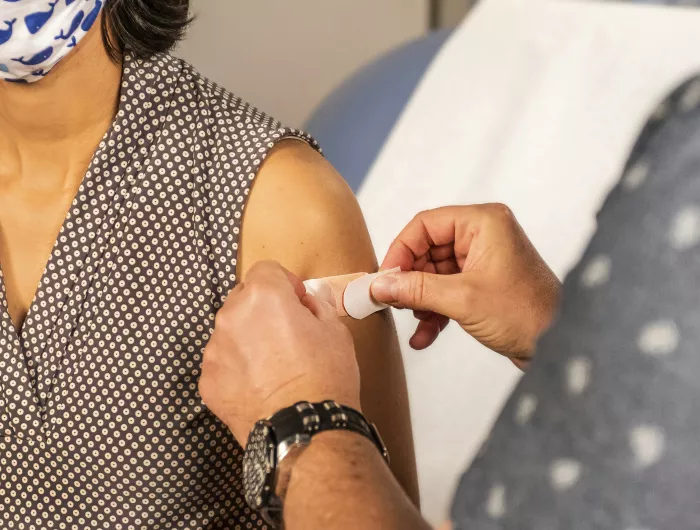Former HHS, FDA officials say FDA deviated from standard practices as it considered approving Novavax COVID-19 vaccine

CDC.
JAMA Viewpoint warns of consequences from political interference in product approvals
Former political appointees at the Department of Health and Human Services and career staff at the Food and Drug Administration, writing in the Journal of the American Medical Association today, say the FDA broke from its own long-standing practices when considering approval of the Novavax COVID-19 vaccine.
Novavax’s COVID-19 vaccine has been in wide use since 2022, when it was granted an emergency use authorization for those 12 and over in the midst of the pandemic. Novavax then decided to seek full FDA approval. Before an April 1, 2025, deadline, career staff at the FDA’s Center for Biologics Evaluation and Research (CBER) recommended full approval of Novavax’s Biological License Application for the vaccine. But the FDA’s Office of the Commissioner paused the decision, prompting HHS Secretary Robert F. Kennedy, Jr., to say that the delay reflected shifting the department’s “priorities to multiple-antigen vaccines.”
That statement itself was a departure from FDA’s practice of considering all incoming product applications regardless of HHS “priorities,” according to the former officials. The FDA deviated still further from its historical practices when it finally approved the application on May 16. The FDA licensed the vaccine only for adults aged 65 or older, while patients 12-64 are required to have an additional condition that puts them at greater risk of severe COVID outcomes before the vaccine is indicated for them. Writing in the New England Journal of Medicine (NEJM) days after the approval, the FDA further stated it would require new, placebo-controlled trials for all COVID-19 booster shots for healthy adults younger than 65.
The former officials note the presence of a political appointee at CBER—unusual at any of the FDA’s various centers— and that, historically, it is exceedingly rare for an FDA Commissioner to be involved in overturning a Center’s recommendation.
HHS and FDA also deviated from standard practice when communicating information about the approval process, including the involvement of HHS to an unusual extent. Historically, FDA has relied on official guidance documents, developed through a public process, to signal its intentions to alter significant policies. In the Novavax case, FDA and HHS officials caused confusion with inconsistent press statements and by announcing new policy via the NEJM article, with no outside expert or stakeholder engagement.
The Viewpoint argues that, if other products are reviewed with similar deviations from standard practice, it would “create confusion rather than transparency and raise questions about the FDA’s commitment to regulatory integrity.”
The former officials writing the Viewpoint are former HHS deputy general counsel Patricia J. Zettler, former HHS Counselor Dr. Stephen Cha, former HHS Counselor for Public Health and Science Sarah Despres, and Dr. Peter G. Lurie, former associate commissioner of FDA, who is now President of the Center for Science in the Public Interest.
Regardless of the merits of the FDA’s Novavax decision, the process by which regulatory decisions are made matters, according to the authors.
“Beyond vaccines, infusing political decisions and political appointees into individual product decisions imperils public health and innovation,” according to the Viewpoint. “Uncertain approval processes with unpredictable approval standards that shift with the political winds could make long-term investment riskier for the research and development that medical PR companies must undertake, potentially diminishing biomedical innovation—all to the detriment of patients.”
# # #
Contact Info: Lisa Flores, 202-777-8368 or Jeff Cronin, 202-777-8370

